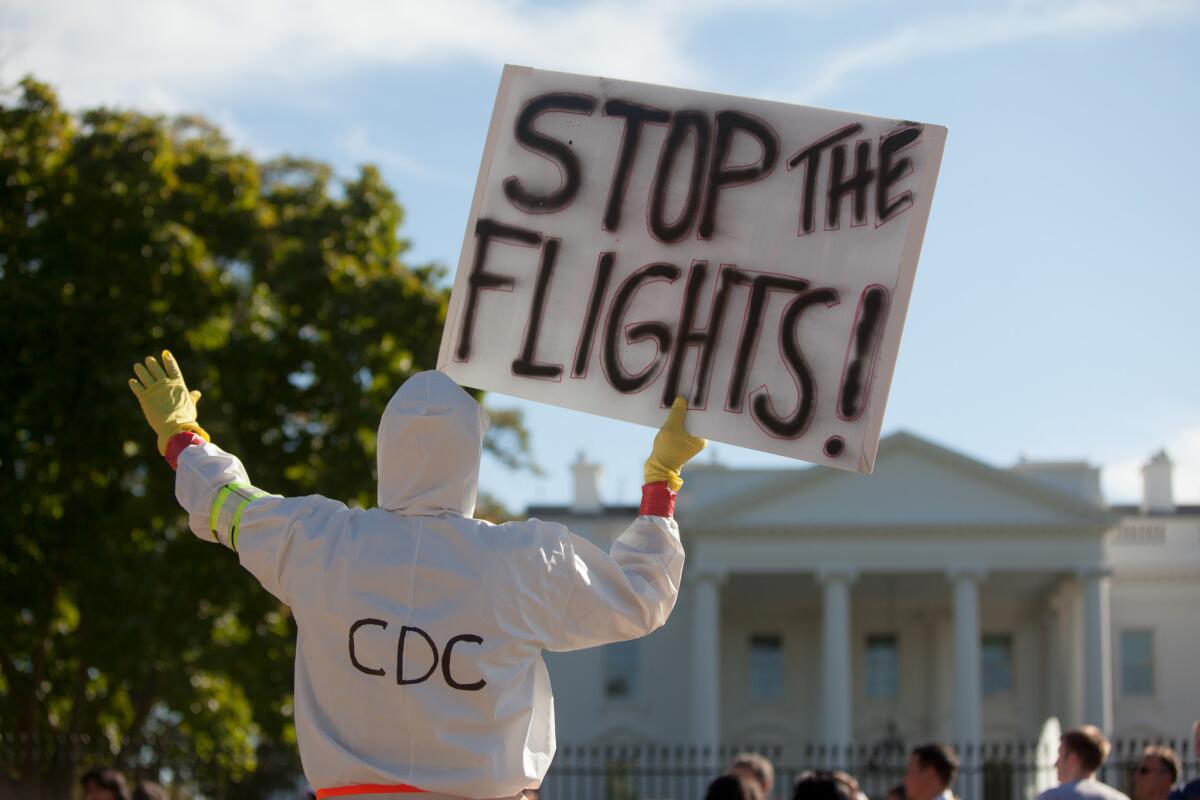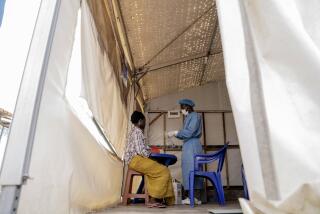After Ebola ebbs, will the world again leave Africa to die?

- Share via
The problem with crisis-oriented assistance programs in the Third World is that crises, no matter how urgent they are, eventually fade.
Too often, when the crisis disappears, so too do the armies of aid workers and buckets of money deployed by the developed world to address them. That has been the history of developmental assistance in Africa, where shameful economic and health conditions have festered for decades, relieved now and then by a turbocharged response to an emergency that catches the developed world’s eye.
There’s reason to fear that the Ebola outbreak in West Africa will follow the same pattern. The explosion of disease and death finally captured global attention late this summer, possibly because the threat of the virus’ spread beyond Africa became inescapable.
Even so, the global response was inexcusably laggard. At the end of August, Medecins Sans Frontieres, the French health organization known in English as Doctors Without Borders, labeled the response “slow and derisory.”
Doctors Without Borders continued: “Today, only a handful of international actors are engaged in the fight against Ebola. But this is nowhere near enough. This is an exceptional crisis, the number of new infections is still on the rise, and the virus has a serious potential to spread to other countries.”
The organization said “more isolation centers have to be set up, epidemiological surveillance and laboratory capacity have to be reinforced, contact tracing and follow-up must be strengthened, communities must be sensitized, experienced staff and training are needed in the field, and general health services must be reopened: These activities must be properly coordinated inside and beyond the borders of the affected countries.”
That’s happening now, nearly two months later, and possibly only because the implications of the West African outbreak terrify the U.S. and European donor countries.
But a large number of chronic diseases and other health conditions beset sub-Saharan Africa, causing much higher death tolls than Ebola (if not such rapid growth in the toll). HIV took nearly 122 lives per 100,000 population in Africa in 2012, according to the World Health Organization. In the United States, the figure was 2.6 (in 2010). Malaria is an endemic killer in Africa, accounting for 62 deaths per 100,000 population; in the United States, the disease is so little-known that the CDC doesn’t even bother to measure it.
Death rates from parasitic diseases (often a reflection of poor water sanitary conditions), infant and maternal injuries, and malnutrition are all an order of magnitude or higher than Ebola, which has taken some 4,500 lives in West Africa as of last week. (See accompanying chart.)
The challenges of Africa’s long-term health crisis can only be met with sustained efforts by donor countries and host governments. Regional conflicts invariably make things worse. Indeed, it is presumed that unrest, especially in Sierra Leone and Liberia, strongly contributed to the outbreak of Ebola in that region and hampered efforts to control it. The outbreak is likely to make general health and economic conditions even worse, for health systems have collapsed and civil unrest may well spread.
Cultural practices, poor transport and communications infrastructure, and poverty all contribute to the intractable nature of health problems on the continent. But global indifference has played its part.
It’s conceivable that the Ebola emergency will wake up the outside world to the need for sustained and sustainable health assistance in Africa. But organizations such as Doctors Without Borders have been calling for such assistance for decades. Ebola may be the turning point. Or it may merely produce a torrent of help that will vanish like an afternoon downpour, leaving drought behind.
Keep up to date with the Economy Hub. Follow @hiltzikm on Twitter, see our Facebook page, or email mhiltzik@latimes.com.
More to Read
Inside the business of entertainment
The Wide Shot brings you news, analysis and insights on everything from streaming wars to production — and what it all means for the future.
You may occasionally receive promotional content from the Los Angeles Times.









